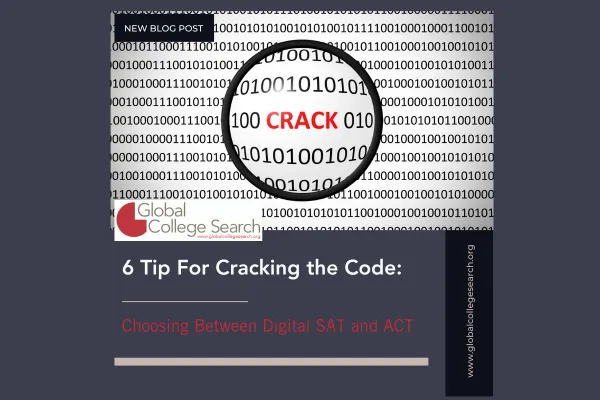
New Year...New Name!

6 Tips For Cracking the Code: Choosing Between Digital SAT and ACT
“The hardest choices in life aren't between what's right and what's wrong, but between what's right and what's best.” - Unknown

Erjwiki, CC BY-SA 4.0 <https://creativecommons.org/licenses/by-sa/4.0>, via Wikimedia Commons
Hey future test-takers and parents!
It's decision time in the world of college admissions, and with the SAT going digital, you might be wondering whether to stick with the digital SAT or consider its long-time rival, the ACT. Alternatively, you might decide to skip the whole standardized test scene and focus your college search on TEST-FREE or TEST-OPTIONAL schools. If that's you, feel free to fast forward ⏭️ past this article. However, if you're eyeing one of those Ivy League schools that just switched back to requiring a standardized test, read on...
Recent figures shown in the chart displayed here indicate that the SAT takers are rebounding at a higher rate than the ACT. But that doesn't mean you need to follow the crowd. Let's dive into the 6 considerations to help YOU make the right choice without breaking a sweat.
1. Personal Preference:
In the world of standardized testing, understanding your personal preferences can significantly impact your testing experience and ultimately contribute to your success. Here's a closer look at why your comfort level with technology plays a crucial role in making the right choice:
Digital SAT Advocates:
Online Proficiency: If you find yourself seamlessly navigating through online assignments, comfortably using digital tools, and generally feeling at ease with a computer, the digital SAT aligns with your existing skills. The transition to an online format might feel like second nature, providing a testing environment where you can leverage your technological proficiency.
Digital Tool Familiarity: The digital SAT comes equipped with tools like highlighting, underlining, and answer elimination at the click of a button. If you appreciate the efficiency and convenience these digital tools offer, you're likely to thrive in the digital SAT environment. These features can enhance your ability to manage time effectively and tackle questions with precision.

Adaptability to Change: Being comfortable with technology often translates to adaptability. The digital SAT not only tests academic knowledge but also your ability to navigate a digital interface. If you embrace change and are open to adapting your test-taking strategies to a digital setting, you might find the digital SAT to be a natural progression.
ACT and Pencil-and-Paper Enthusiasts:
Analog Affinity: If you have a strong preference for traditional methods and enjoy the tactile experience of pencil and paper, the ACT might resonate more with your testing style. The ACT remains mainly a paper-based test (although they are slowly rolling out an online version), allowing you to write, circle, and physically interact with the test materials. For those who find comfort in the tangible, the ACT's format might feel more familiar.
Consistency in Testing Environment: Some individuals prefer the consistency of a paper-based testing environment. If you value the predictability and tactile nature of traditional testing, the ACT provides a stable platform that aligns with your preference. It ensures that your test experience remains unchanged, allowing you to focus solely on the content.

Limited Reliance on Technology: Choosing the ACT over the digital SAT may appeal to those who prefer to limit their reliance on technology during high-stakes assessments. If the idea of disconnecting from screens and engaging with a physical test booklet is more conducive to your concentration and focus, the ACT's paper-based format might be the better fit.
In essence, considering your comfort level with technology is not just about the tools and interface but also about aligning your testing experience with your strengths and preferences. Whether you're a digital enthusiast or a pen-and-paper advocate, recognizing and embracing your personal preferences will contribute to a more positive and successful testing journey.
2. Testing Format:
Let's dive into the unique ways the ACT and SAT assess college readiness and how understanding their distinctive approaches can guide you in making the best choice based on your strengths and preferences.
ACT – The Jack of All Trades:
The ACT is like the Swiss Army knife of standardized tests, covering a broad spectrum of subjects. It includes English, Math, Reading, and Science sections, along with an optional Writing section. This variety means you get a taste of everything, showcasing your proficiency in multiple academic domains.
Broad Range of Subjects: With four main sections, the ACT provides a snapshot of your skills in various subjects. It doesn't just test your knowledge; it evaluates your ability to apply what you've learned across different areas.
Time Management Matters: The ACT challenges your time management skills as you navigate through a mix of subjects. If you're someone who enjoys switching gears and showcasing versatility in a time-sensitive environment, the ACT might be your testing playground.
SAT – The Thinker's Challenge:
On the other hand, the SAT takes a more targeted approach, honing in on reasoning and problem-solving skills. While it covers Reading, Writing and Language, and Math sections like the ACT, the SAT is known for its emphasis on critical thinking and analytical abilities.
Focus on Reasoning: The SAT is your go-to test if you enjoy delving deep into problems and flexing those reasoning muscles. It's not just about knowing the facts; it's about how well you can analyze, interpret, and solve complex problems.
Analytical Writing: The SAT includes an optional Essay section that challenges you to craft a well-reasoned argument. If you fancy expressing your thoughts and analyzing different perspectives in a written format, the SAT might align better with your strengths.
Consider Your Strengths and Preferences:
When choosing between the two tests, think about what gets you in your testing groove.
If You Love Variety: If you thrive on diversity and enjoy showcasing your skills across different subjects, the ACT's comprehensive approach might be your sweet spot.
If You're a Critical Thinker: If analyzing problems and approaching questions from a critical perspective is your forte, the SAT might be your ideal testing ground.
Time Management vs. Depth of Thought: Consider whether you're more comfortable managing your time efficiently across various subjects (ACT) or if you prefer diving deep into fewer subjects with a focus on critical thinking (SAT).
Ultimately, understanding the unique flavor each test brings to the table allows you to make an informed decision. Consider your academic strengths, testing preferences, and the skills you want to highlight on your college application journey. So, are you ready for the ACT's variety or the SAT's analytical challenge? The choice is yours! 🌟📚
3. Time Management:
The digital SAT is designed to be more time-efficient, providing quicker score turnaround and a more streamlined testing experience. If you prefer a faster pace and enjoy the idea of receiving your results promptly, the digital SAT might be the better choice for you especially if you're eager to know how you performed and want to expedite your college planning journey. On the flip side, if you're someone who appreciates the rhythm of traditional testing – the feel of paper, the sound of flipping pages – the ACT's paper-based format might align better with your comfort zone. It maintains the familiarity of a classic testing experience.
4. Practice Opportunities:
Absolutely, let's dive into the importance of leveraging practice resources for both the digital SAT and the ACT to help you make an informed decision based on your strengths.
Practice Resources for Digital SAT and ACT:
Practice Makes Perfect: Before committing to either the digital SAT or the ACT, it's crucial to immerse yourself in practice materials. Both tests offer a treasure trove of resources, including sample questions, practice tests, and official guides. These materials provide a sneak peek into the types of questions you'll encounter on the actual test day.

Familiarizing with Question Types: Each standardized test has its own unique question types and formats. By engaging with practice materials, you gain insight into the specific skills each test assesses. Whether it's the digital SAT's emphasis on reasoning and problem-solving or the ACT's comprehensive coverage of subjects, practice allows you to familiarize yourself with the intricacies of each test.
Understanding Pacing: Time management is a crucial aspect of standardized testing. Practice materials give you the opportunity to gauge your pacing and develop effective time management strategies. Whether you're tackling a reading passage, working through math problems, or crafting a written response, practicing under timed conditions prepares you for the real testing environment.
Exploring Overall Structure: Both the digital SAT and the ACT have distinct structures. The digital SAT, with its online interface and digital tools, offers a different testing experience compared to the traditional paper-based ACT. Exploring practice materials not only helps you understand the content but also allows you to navigate the test's overall structure, tools, and interface.
Determining Your Alignment:
Identify Your Strengths: As you engage with practice materials, pay attention to the sections where you feel most confident and those that pose a challenge. Recognizing your strengths and weaknesses helps you tailor your test preparation to focus on areas that need improvement.
Consider Your Preferences: The more you practice, the clearer your preferences become. Do you enjoy the digital features and tools offered by the SAT, or do you find comfort in the more traditional format of the ACT? Practice allows you to experience both and identify which test aligns better with your personal preferences.
Evaluate Your Performance: Regular practice sessions provide an opportunity to track your progress. Monitor your performance, identify patterns in your mistakes, and adjust your study plan accordingly. This ongoing evaluation is essential for refining your skills and building confidence.
In essence, the key to making an informed decision lies in active engagement with practice materials. Don't just skim through – immerse yourself, understand the nuances of each test, and let your performance guide you. It's like test-driving both options before choosing the one that feels like the perfect fit for your testing journey. 🚗✨
5. College Requirements:
Certainly, let's delve deeper into the importance of checking the specific requirements of the colleges you're interested in when deciding between the digital SAT and the ACT.
College Preferences and Policies: Each college has its own set of admission policies and preferences when it comes to standardized testing. Some colleges may express a preference for one test over the other, while others might accept either the SAT or ACT.
Some institutions might be test-optional, meaning they do not require standardized test scores for admission. In this case, you have the flexibility to decide whether to submit scores, depending on your performance and the admissions policies of each school.
Program-Specific Requirements: Certain academic programs or majors within a college may have specific testing preferences. For example, a science or engineering program might prefer the ACT due to its inclusion of a dedicated Science section, while a humanities program may have no specific preference.
Admission Statistics: Research the admission statistics of your dream colleges. Some schools may provide data on the average test scores of admitted students. This information can give you an idea of the testing profiles of successful applicants and guide your decision-making process.
Application Flexibility: Check if the colleges you're interested in offer flexibility in terms of which test scores you can submit. Some schools may allow you to submit scores from either the SAT or ACT, giving you the freedom to choose the test that showcases your strengths.
Updated Admission Policies: Keep in mind that admission policies can change, so it's essential to stay updated. Colleges may modify their testing requirements, adopt test-optional policies (check out our friends at FairTest.org LIST of schools), or adjust preferences based on their evolving evaluation criteria.
Test Superscoring: Some colleges practice superscoring, where they consider the highest section scores across multiple test sittings. Understanding whether a college engages in superscoring can impact your decision on retaking the test or focusing on specific sections.
Reach Out to Admissions Offices: When in doubt, don't hesitate to reach out to the admissions offices of the colleges you're considering. Admissions staff can provide valuable insights into their testing preferences and offer guidance tailored to your individual circumstances.
Researching the testing preferences and requirements of your dream colleges is a crucial step in making an informed decision. This process ensures that your testing efforts align with the expectations of the institutions you're applying to, increasing your chances of presenting a competitive application. It's like customizing your approach to fit the unique preferences of each college on your wishlist. 🎓🔍

6. Flexibility in Retakes:
Consider your retake strategy. The digital SAT provides more flexibility in terms of retakes, with multiple test dates throughout the year. If you envision needing to retake the test, the digital SAT might offer more opportunities for improvement.
CONCLUSION:
Remember, there's no one-size-fits-all answer. The choice between the digital SAT and the ACT ultimately depends on your personal preferences, strengths, and testing style. Take the time to explore both options, practice, and make an informed decision that sets you up for success on your college journey. Happy testing! 🌟🎓
CALL US! 312-725-3279

© globalcollegesearch.org | ALL RIGHTS RESERVED | TERMS & CONDITIONS | Privacy Policy |
